Acer V7-482PG-9884 Review: Everything You Need
by Jarred Walton on August 24, 2013 12:00 AM ESTAcer V7 Gaming Performance
Our focus for gaming performance is going to be on our Value and Mainstream settings, although we’ve also run our Enthusiast settings and as usual you can find the results in Mobile Bench. The short summary is that in most cases, the Aspire V7 easily handles the Value settings and typically gets above 30 FPS on the Mainstream settings; what that means for 1080p gaming is that medium detail should suffice, but anything more and you’re often going to drop below 30 FPS. I’ll save additional commentary for after the graphs break….
One other item to discuss before we get to the gaming benchmarks is the 4GB DDR3-1800 RAM used on the GT 750M. I commented earlier that the amount of RAM is overkill, and the decision to use DDR3 instead of GDDR5 would likely reduce performance quite a bit. There are of course ways to mitigate this, as well as investigate how much the GPU memory bandwidth limits performance. I installed MSI Afterburner 3.0 Beta 14 (gotta love the monthly betas that keep expiring...), and proceded to overclock just the RAM. Initially I tried for DDR3-2500, but that resulted in a frowny-faced BSOD (Windows' 8 has a much nicer BSOD, apparently). DDR3-2300 failed as well, but without the BSOD, while DDR3-2200 ran through all of our gaming benchmarks without issue. That represents a 22% overclock of the RAM, and I've included the results in the charts below.
Value Gaming Performance
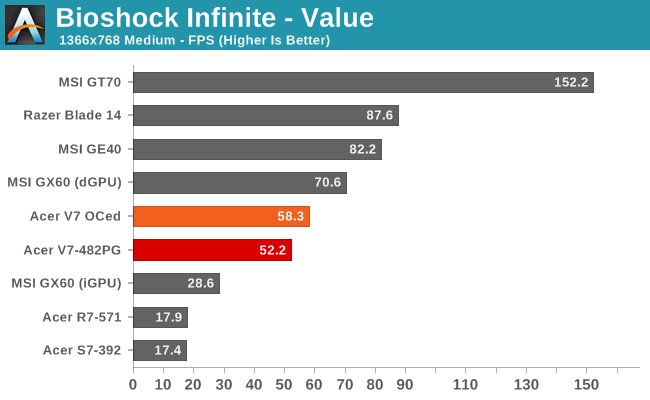
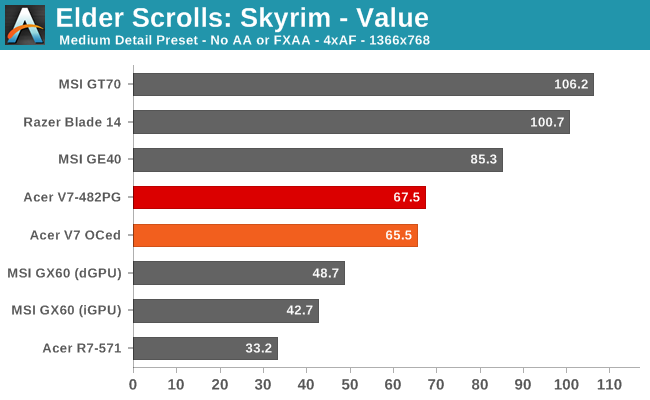
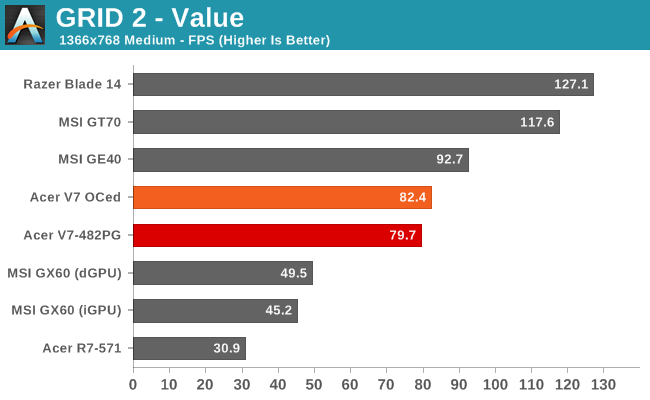
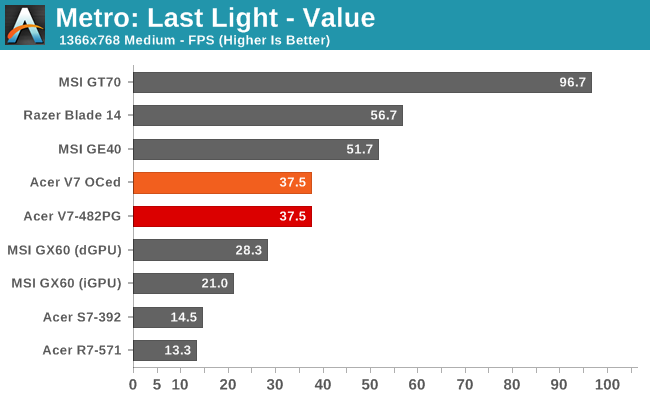
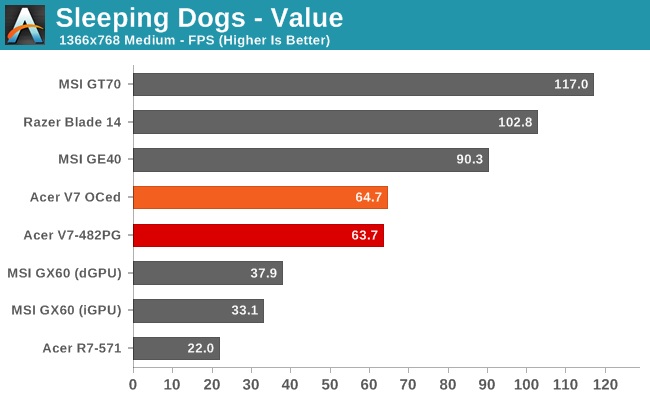
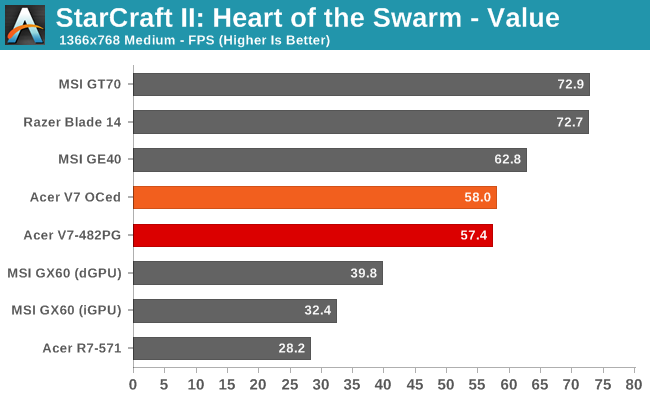
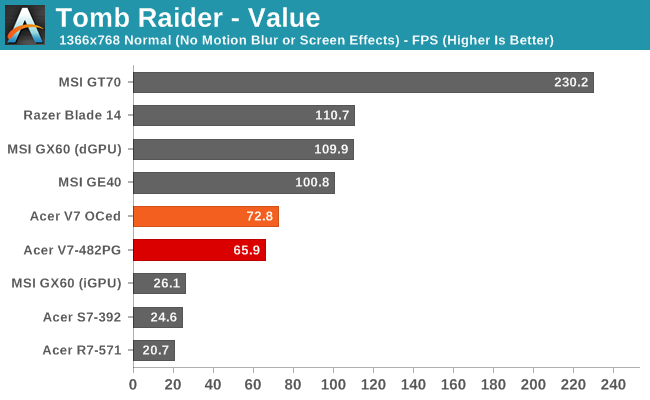
Mainstream Gaming Performance
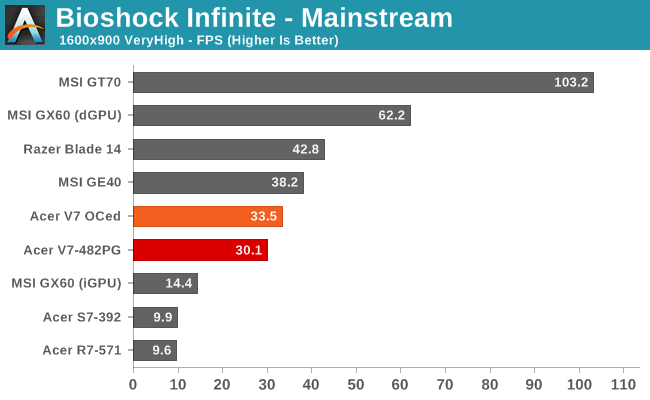

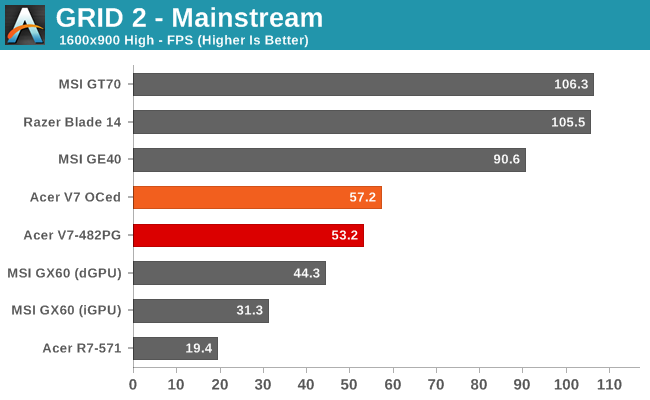
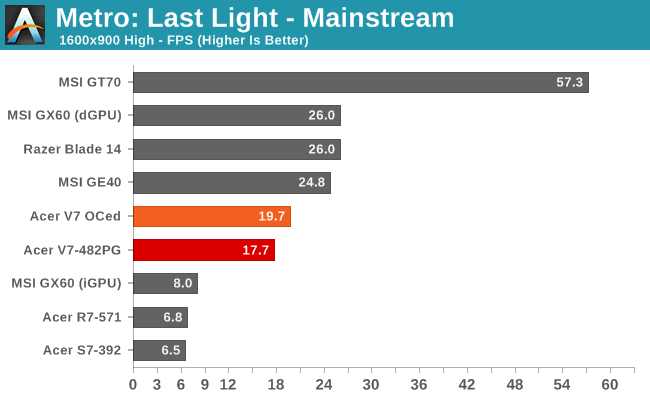
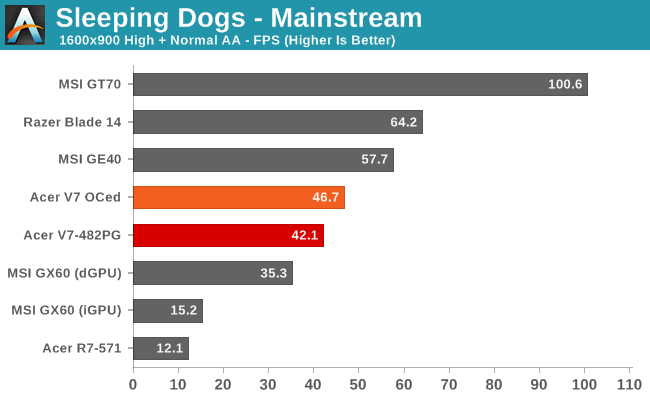


The two most demanding games in our test suite right now are Metro: Last Light and Company of Heroes 2 – I didn’t include graphs for the latter above, simply because we’ve only run it on three laptops so far, but it ends up being the slowest running game in our suite by far to the tune of 23.7 FPS at 1366x768 medium/low settings. It’s basically the opposite of StarCraft 2: Heart of the Swarm, where it apparently pounds the GPU (shaders) and doesn’t require as much of the CPU. Speaking of which, Skyrim and StarCraft 2 are in the interesting camp of being more CPU limited, so we actually see better numbers from the Aspire V7 with GT 750M than we get from the MSI GX60 with HD 7970M, even at our Mainstream settings. Somewhat surprisingly, GRID 2 and Sleeping Dogs also fall into that category, at least if we limit ourselves to the Mainstream settings.
It all goes back to what I was talking about in the introduction: balance. The Acer V7 is certainly not the fastest laptop on the block, and the GT 750M really has no business outperforming an HD 7970M. The problem is the CPU-GPU balance in the GX60 is just way off. In some games like Tomb Raider and Bioshock Infinity, even moderately slow CPUs are fast enough; in other cases, however, more (single-threaded) CPU performance is required. In an Ultrabook like the V7, I think the GT 750M is a pretty good fit for a Haswell ULT CPU.
My only wish is that Acer had equipped the GPU with 2GB GDDR5 memory; I don’t know exactly how much that would have helped, but simply overclocking the DDR3 memory by 22% produced some interesting results. At our less demanding Value settings, the overclock only improves performance by 3.6% on average, and in one game at least (Skyrim) it was actually slightly slower. The reason for the lack of improvement is that Value settings tend to be more CPU constrained, so increasing the GPU performance doesn't always help much; still, Bioshock and Tomb Raider both improve by over 10%. Move up to the Mainstream settings and the increased memory bandwidth becomes far more useful. There we see an average performance increase of 11.5%, and only Skyrim and GRID 2 fail to post double digit percentage improvements.
If all of this can be achieved with a 22% overclock of DDR3 RAM, what would more than doubling the bandwidth with GDDR5 accomplish? It definitely wouldn't reduce performance, and I wouldn’t be surprised to see an extra 15-30% performance increase at our Mainstream settings for a relatively minor change in BOM costs. Even without GDDR5, though, the Acer V7 posts respectible numbers and can handle most games at 1080p and Medium detail. It's not a gaming enthusiasts dream laptop, but for less demanding gamers it's more than sufficient.










62 Comments
View All Comments
tackle70 - Saturday, August 24, 2013 - link
I guess I'm just a computing dinosaur... I do almost all my work on desktops, and while I love a laptop as a backup portable work/netflix/whatever box, I just can't stomach the thought of spending $1k+ on one.My 2.5 year old $450 HP Probook 4430s may have a fugly screen and not be the thinnest or fastest thing out there, but I can't see replacing it anytime soon for how I need to use a laptop.
Impulses - Sunday, August 25, 2013 - link
Guess that makes me a bit of a dinosaur too... Or just a geek and a gamer, I've been thinking of getting a laptop for a while to replace an aging netbook but between my desktop and my tablet I tend to use the netbook a whole lot less than I used to...And I wouldn't be happy with a budget laptop (let alone another netbook) if it weighed half a dozen pounds or had a crap screen (not after getting 3x24" IPS displays for the desktop and looking at the new Nexus 7 display...). Work needs might eventually force my hand tho, and while I'd like a system like this Acer I'd probably opt for something slightly cheaper/lighter without a dGPU.
et20 - Sunday, August 25, 2013 - link
Good review. Thank you.Please stop saying "the only company that can get away with charging Apple prices is Apple".
It's stupid and insulting.
It's insulting to Acer and the other manufacturers to imply that they don't deserve proper margins for developing good products.
It's insulting to consumers to imply that most of them are not discerning enough to pay what a good product is worth.
It's insulting to Apple to imply that they somehow "get away" with making more than subsistence profits for building good products.
It's insulting to Apple product users to imply that they're been fooled into paying more than rock bottom prices for good products.
So just stop with this BS and admit that Mac and PC hardware offer largely the same value for money.
JarredWalton - Sunday, August 25, 2013 - link
You can say "it's insulting" all you want, but that doesn't make it true. The reasons for why Apple can charge more are numerous, but just to cover a few:1) Brand recognition
2) Good products
3) Unique OS
4) An ecosystem that many users like
I don't personally like Apple products enough to own them, other than an iPod Touch I got from work, but they do get plenty of things right. There is however no question that Apple charges a significant premium on their products; the old joke is "everyone buys two, so if you have a problem the first replacement is free, no questions asked." To suggest that they're "largely the same value for money" is stupid and insulting to anyone that can do math. Let me go over it again:
MacBook Air 13: $1300, Acer V7-482PG-9884: $1300
On the Apple side:
Build quality: minor win for Apple; let's be generous and call it $100
256GB SSD: $100 more than 24GB + 1TB HDD
Thunderbolt: $50 (again, being more than generous)
+$250 relative value
On the Acer side:
Better 1080p AHVA LCD: $75 more than 1400x900 TN
Touchscreen: $100 extra
Faster i7 CPU: $150 more than i5-4250U
GT 750M: $100 add on
+$425 in relative value (BoM costs)
So right there, with some math that's very kind to Apple, we have at least a $175 additional profit margin for the MacBook Air 13 (upgraded model). If we were to go through all of the components for both laptops and figure out a realistic BoM, I figure Apple's total profit margin on the upgraded MBA13 is roughly twice what Acer makes off the V7-482PG. And yet, Apple will sell 10X or maybe even 100X MBA13 as Acer will of the V7-482PG.
Oh, but to suggest that Apple can charge more because they're Apple is stupid and insulting. I forgot.
teiglin - Sunday, August 25, 2013 - link
It's a bit silly to add after Jarred's clear (and snarky) response, but any discussion of "value" has to bear in mind that many factors that influence value are subjective. On the Apple front in particular, I was in the market for a 13" laptop recently and strongly considered the MBA, thanks largely to touchpad quality, plus the unique availability of HD5000 vs. HD4400 in all the available ultrabooks. However, for me, shipping OSX is mostly a downside--it adds the cost of a Windows license to my purchase, not to mention a nonstandard keyboard layout under Windows.So value is in the eye of the beholder. The fact that Macs have higher profit margins than most Windows boxes is not an insult to Mac users; it just means that Mac users are willing to pay more money for less hardware, in order to get the other benefits of owning a Mac. Life would be simpler if Apple fanboys (really, fanboys of all stripes) would be a little less touchy about perceived attacks on themselves or their company.
Impulses - Wednesday, August 28, 2013 - link
To me, the only strong value proposition involved with a Macbook is the fact that after 2-3 years of use someone's likely to pay me 2-3x for it what an equivalent Windows laptop PC would be worth at that point... Resale value's not enough of a reason for me to deal with bootcamp etc tho. They're nice systems and all, just not for me.I'm not sure when companies started deserving higher margins or not or howthis somehow became a moral issue... Brand recognition and PR (backed up by solid build quality) sells and can easily inflate a product's worth, don't be naive and try to pretend otherwise.
ananduser - Sunday, August 25, 2013 - link
There is no shame in charging extra for the brand. If you truly believe that your company makes premium products, then you must price accordingly. You may buy macs for their technical nuances and exclusivities, but I'm afraid you're in the minority. So, unless you need OSX, you're relatively paying more for less; Jarred above me is right.joe_dude - Monday, August 26, 2013 - link
The Canadian model of the V7 is far better in terms of price point. As for Apple, they will always be "pay more for less". Also, battery life would last longer if the extra diagnostics were turned off, since Windows continually writes that info to disk. It's for enterprise/network use (which is something Apple doesn't have to worry about).dareo - Monday, August 26, 2013 - link
Is it possible to easily swap out the 24GB SSD Cache on this model with a Samsung 840 EVO 256GB SSD, using it as the primary drive for the OS and apps, and reserving the HDD for documents?JarredWalton - Monday, August 26, 2013 - link
From the hardware side, it's easy. On the software side, you'll basically want to do a clean install of the OS and you wouldn't want ExpressCache running as you would have no need for it. For most of our readers, I'd guess doing a clean Win8 install is simple enough, particularly if they're willing to open up the laptop and replace the mSATA drive in the first place. :-)